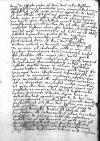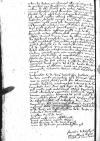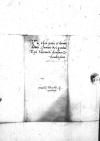Nihil est, quod mihi gratias agat Reverendissima Dominatio Vestra, si quo illam obsequii mei genere demereor. Facio enim pro officio, facturus etiam semper pro virili mea.
⌊Constellato⌋ procul dubio spiritus accesserunt, quandoquidem ita est illic honorifice acceptus. Habere nunc hic dicitur servitorem, qui, ut mihi renuntiatum est, litteras ad ⌊maiestatem⌋ attulit reginalem, quibus de domino ⌊episcopo Pomeraniae⌋ queritur, quod monasteria spoliaverit. Cum id ⌊reverendissimo domino⌋ dixissem, credere noluit ea de causa missum huc esse. In ea enim est sententia, quod ⌊ei⌋ cum domino ⌊episcopo Pomeraniae⌋ bene conveniat. Latet hic servitor ille neque sciri vult, quod venerit; multo minus, qua de causa venerit. Dominus ⌊palatinus Marienburgensis⌋ rediit rebus infectis. Scribit tamen in caelum laudibus omnes vehere ⌊maiestatem regiam⌋, quod unus hic princeps vere Christianus repertus sit, qui pacem in Germania conciliare atque eas, quae impendent illi calamitates, avertere ab ea conaretur. Ac suadet modis omnibus, ut quemadmodum coepit pergat neque nisi perfecta re conquiescat. Quod vehementer optare principes videntur.
Quae vero in castris ⌊caesaris⌋ agantur, ex ipso Reverendissima Dominatio Vestra iam opinor cognovit.
Appellationem ⌊Cornelii⌋ ⌊Banda⌋ prosecutus est, sed ⌊reverendissimo domino⌋ visum non erat eum proficere quicquam posse, nisi prius de periurio docuisset. Datum est itaque illi mandatum ad Gedanenses, si quam ⌊Cornelius⌋ Melchiori de periurio actionem intentare vellet, ut ei ius dicerent et quod iuris est, decernerent. Sed erit causa haec perdifficilis.
De ⌊Alexandro⌋ deque potestate tenebrarum scripsi antea. Habuimus litteras a domino ⌊Caspare⌋  AAWO, AB, D. 19, No. 66_2 eodem die datas, quo fuerunt illae ab ⌊Alexandro⌋, de quibus per Ioachimum Kitta scripsi. In iis eadem de illo scribit, quae antea, nondum enim promulgatum erat decretum. Itaque quod scribit de se absoluto ⌊Alexander⌋, certum non est.
AAWO, AB, D. 19, No. 66_2 eodem die datas, quo fuerunt illae ab ⌊Alexandro⌋, de quibus per Ioachimum Kitta scripsi. In iis eadem de illo scribit, quae antea, nondum enim promulgatum erat decretum. Itaque quod scribit de se absoluto ⌊Alexander⌋, certum non est.
Quod causam attinet Elbingensium contra ⌊Schroter⌋, scripsit copiose ⌊reverendissimus dominus⌋. Eadem repetere opus non est. De moneta, quae per Gedanenses cuditur, non silebitur in comitiis, nisi quod habent privilegium, quod iure quemadmodum infringi possit, non video. Quando autem futura sint comitia, nescimus adhuc. Incipit tamen iam de illis mentio fieri hidden by binding⌈[ri]ri hidden by binding⌉.
De Rhedensi praefectura, quod quidem ego sciam, nihil impetravit, ius autem exspectativae pridem hidden by binding⌈[em]em hidden by binding⌉ habet. Fortassis ea de causa servitor eius hic est.
Dominus ⌊episcopus Pomeraniae⌋ ternas iam ad me hidden by binding⌈[e]e hidden by binding⌉ dedit litteras perhumaniter scriptas. Quae ⌊Gedani⌋ egerit, quae cum monachis, omnia copiose perscribit et incredibilem erga me favorem prae se fert. Sed ego novi pridem hominem, de quo plura in scheda ⌊reverendissimi domini⌋ cognoscet.
Deum precor, ut Reverendissimam Dominationem Vestram diu servet hidden by binding⌈[t]t hidden by binding⌉ incolumem et felicem. Cuius me gratiae commendo.
Patruelis Reverendissimae Dominationis Vestrae venit huc tardius, quod se hidden by binding⌈[se]se hidden by binding⌉ in via morbo correptum esse diceret. Quae res in causa fuit, quod hic ⌊Mauricius⌋ est paulo diutius commoratus. Litteras Reverendissimae Dominationis Vestrae mandato ⌊reverendissimi domini⌋ ipse legi s(erenissimae) or s(acrae)⌈s(erenissimae)s(erenissimae) or s(acrae)⌉ ⌊maiestati regiae⌋
, sed paulo post intervenit ⌊maiestas reginalis⌋, cuius adventus negotium turbavit. Urgebo tamen opportuno tempore, ut quod optat Reverendissima Dominatio Vestra, optatum ferat.
Mitto, quae ⌊Vienna⌋ scripsit dominus ⌊Sigismundus ab Erberstein⌋ ⌊reverendissimo domino⌋. Recentiora his nova non habemus. Exemplum responsi ⌊maiestatis imperatoriae⌋ mittet patruelis Reverendissimae Dominationi Vestrae, cui describendum dedi.
Datae 15 Calendis Decembres.
 AAWO, AB, D. 19, No. 66_2 eodem die datas, quo fuerunt illae ab
AAWO, AB, D. 19, No. 66_2 eodem die datas, quo fuerunt illae ab 

